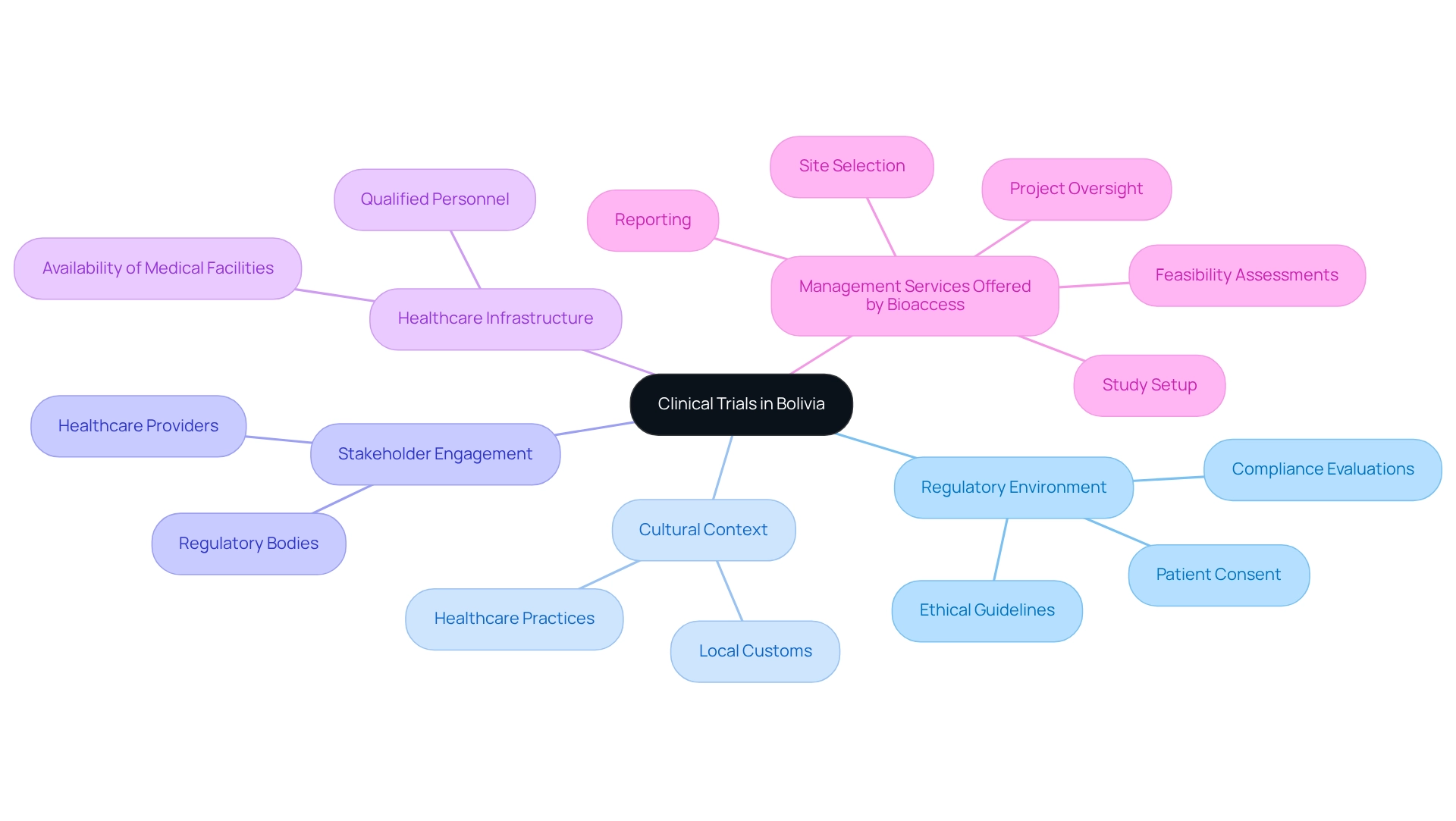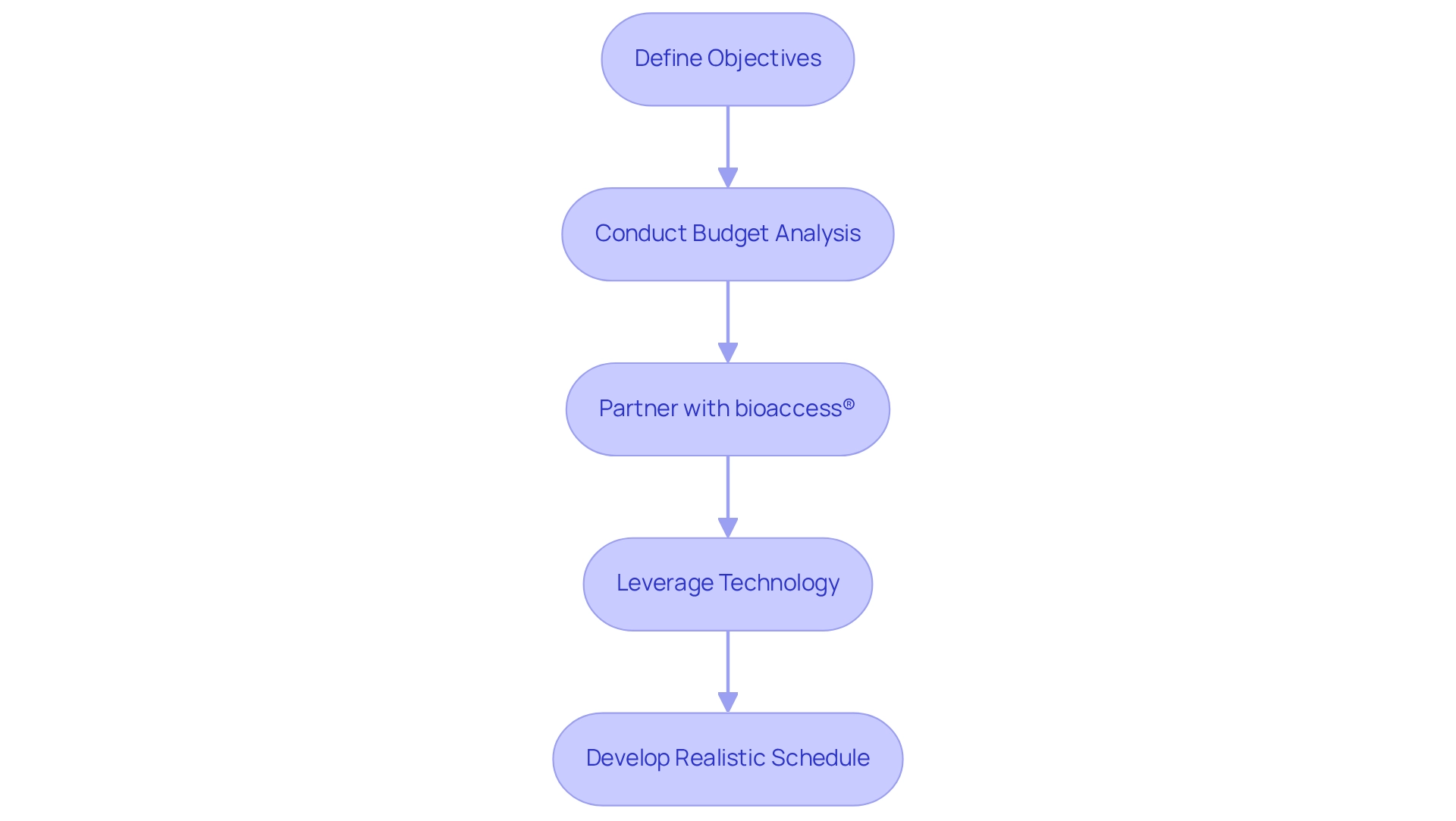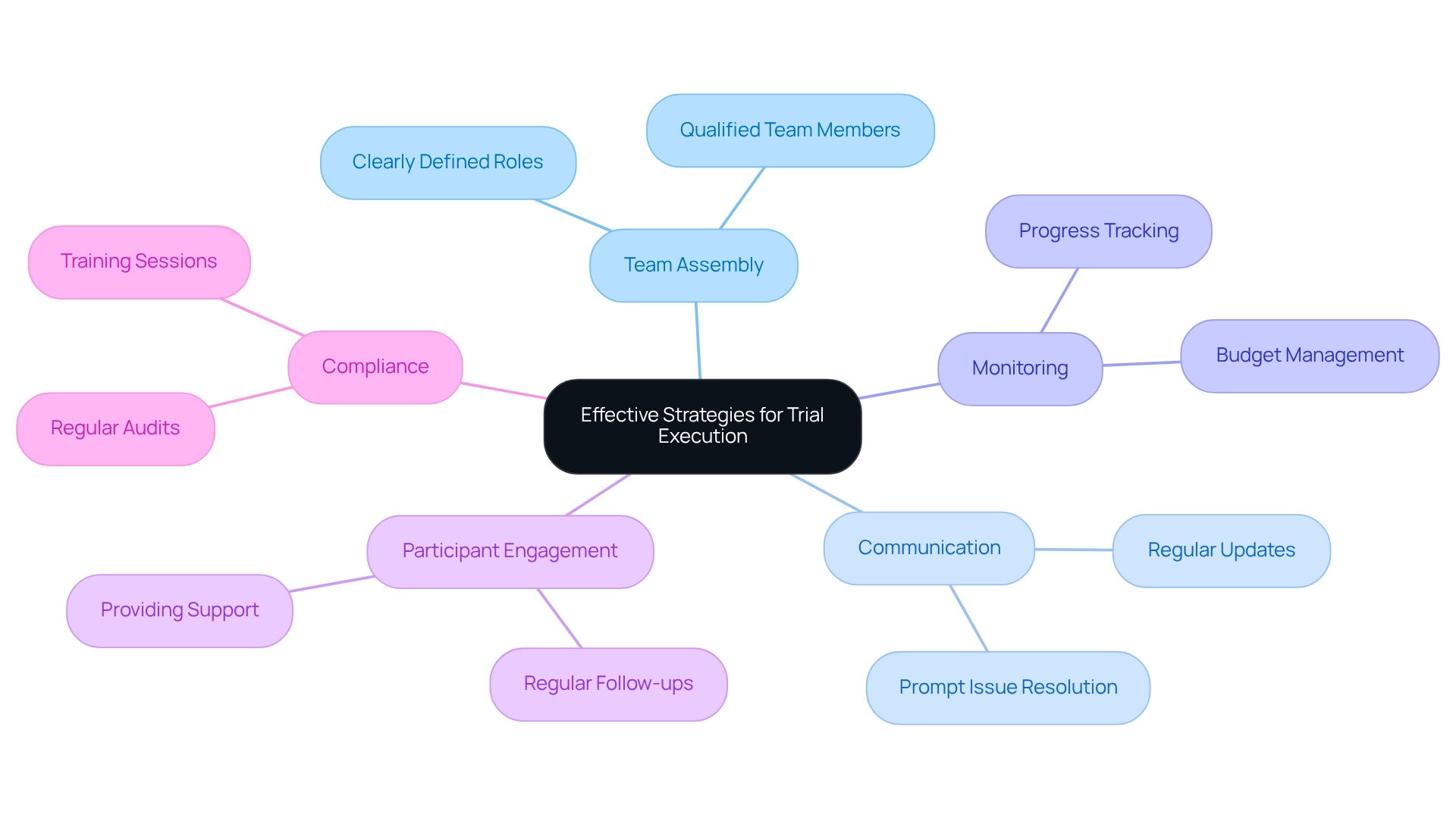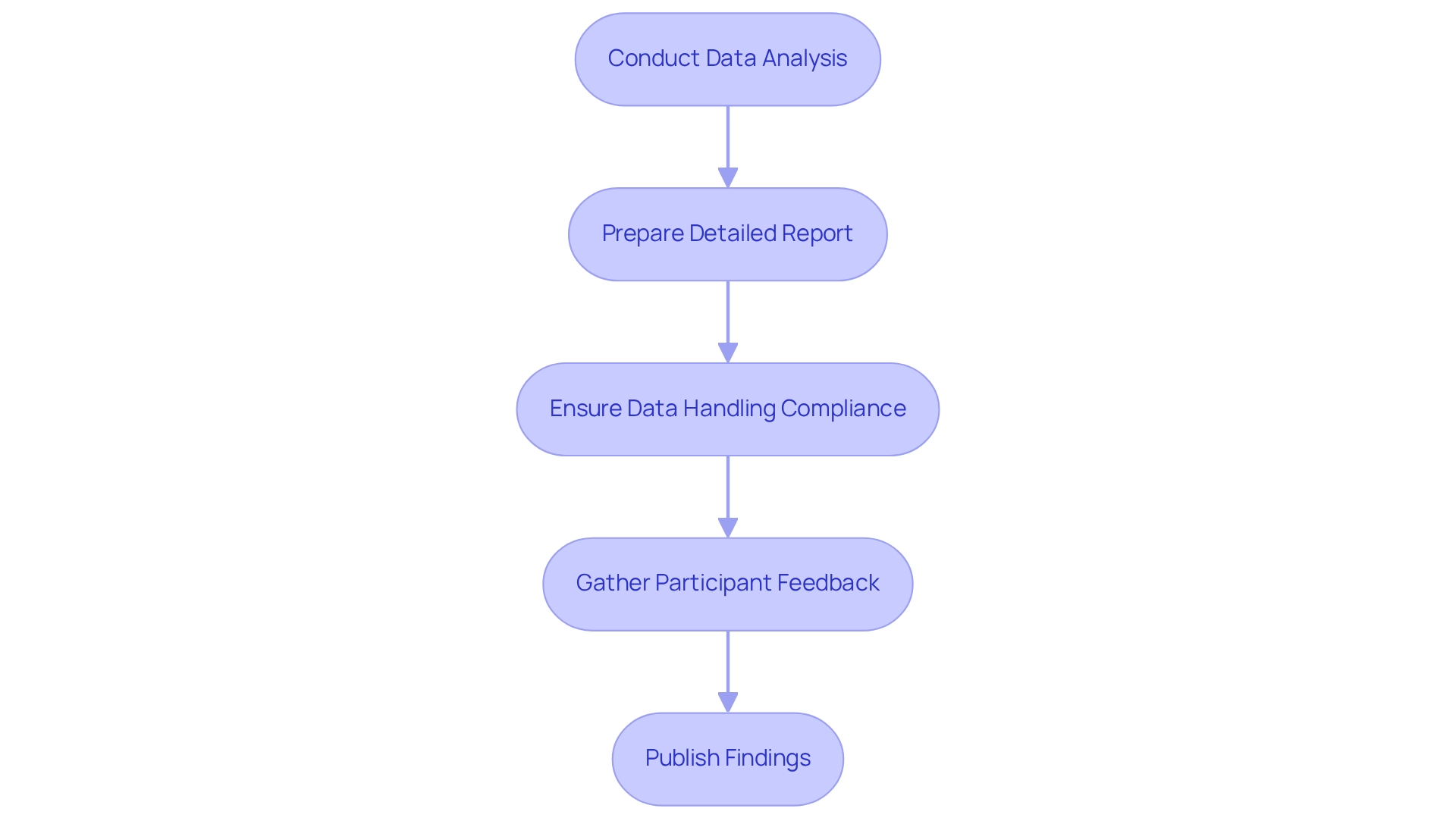Overview
Cost-efficient trials in Bolivia are achievable through a comprehensive understanding of the regulatory environment, active engagement with local stakeholders, and the strategic use of technology and regional partnerships. This article highlights the critical importance of having a thorough grasp of local laws and healthcare infrastructure. Such knowledge, combined with strategic planning and effective resource allocation, is essential for enhancing trial success and minimizing costs. By recognizing these factors, stakeholders can significantly improve their operational efficiency and outcomes in clinical research.
Introduction
Navigating the intricate landscape of clinical trials in Bolivia necessitates a profound understanding of the regulatory framework, cultural nuances, and healthcare infrastructure. As the demand for innovative medical solutions escalates, so too does the imperative for effective trial management that complies with local laws and ethical guidelines.
This article explores the essential steps for successfully conducting clinical trials in Bolivia, encompassing:
- Planning
- Execution
- Post-trial analysis
By leveraging insights from seasoned professionals and established organizations, researchers can significantly enhance the feasibility, efficiency, and overall success of their studies in this burgeoning market.
Understand the Landscape of Clinical Trials in Bolivia
To effectively conduct cost-efficient trials in Bolivia, understanding the regulatory environment governed by the National Health Authority (Autoridad Nacional de Salud) is crucial. Familiarize yourself with regional laws regarding clinical research, including ethical guidelines and patient consent requirements. Additionally, consider the cultural context, as patient recruitment and retention may be influenced by local customs and healthcare practices.
Engaging with regional stakeholders, such as healthcare providers and regulatory bodies, will provide valuable insights into the operational landscape and potential challenges. Furthermore, assess the healthcare infrastructure, including the availability of medical facilities and qualified personnel. A comprehensive understanding of these components will enable you to tailor your experiment design to the regional context, ultimately enhancing the viability and success of cost-efficient trials in Bolivia.
At bioaccess, we offer extensive management services for studies that include:
- Feasibility assessments
- Site selection
- Compliance evaluations
- Study setup
- Import permits
- Project oversight
- Reporting
- Review and feedback on research documents
- Nationalization of investigational devices
Our team, featuring specialists like Juan Cuya, MD, and Katherine Ruiz, is dedicated to navigating the complexities of regulatory matters, ensuring that your clinical studies are conducted efficiently and in accordance with local regulations.

Plan Your Trial: Key Steps for Cost Efficiency
Begin by outlining clear objectives for your trial, including both primary and secondary endpoints. This clarity will not only guide your study design but also facilitate effective resource allocation. Following this, conduct a comprehensive budget analysis, identifying all potential costs—site fees, patient recruitment expenses, and regulatory compliance costs. Partnering with bioaccess®, a leading Contract Research Organization in Latin America with over 20 years of expertise in Medtech, can facilitate cost-efficient trials in Bolivia by providing access to vetted regional resources and partnerships, significantly reducing costs. For example, collaborating with local hospitals or clinics through bioaccess’s extensive network may yield lower fees for patient recruitment.
Moreover, consider leveraging technology to enhance process efficiency. Implementing Electronic Data Capture (EDC) systems can minimize data entry errors and improve overall data management. Lastly, develop a realistic schedule that accounts for potential setbacks, ensuring your experiment remains on track and within budget. By utilizing bioaccess's extensive management services for studies—including Early-Feasibility Studies, First-In-Human Studies, and Post-Market Follow-Up Studies—you can enhance the overall efficiency and success of your research in Latin America, ultimately leading to cost-efficient trials in Bolivia.

Implement Effective Strategies for Trial Execution
To ensure effective testing execution, it is crucial to assemble a qualified team with clearly defined roles and responsibilities. Regular communication among team members is essential for promptly addressing issues and maintaining project momentum. Implementing a robust monitoring system to track progress against timelines and budgets allows for real-time adjustments as needed. Engaging with participants throughout the study enhances retention rates, leveraging proven strategies from bioaccess™ and Caribbean Health Group's partnership, which has achieved over 95% retention rates in research. This engagement can include:
- Regular follow-ups
- Providing support to address any concerns they may have
Additionally, ensuring compliance with all regulatory requirements involves conducting regular audits and training sessions for your team. This proactive approach mitigates risks and upholds the integrity of your study, drawing on the expertise of bioaccess® in managing Early-Feasibility, First-In-Human, Pilot, Pivotal, and Post-Market Follow-Up Studies. The initiative is further supported by Colombia's Minister of Health, reinforcing the credibility of these efforts. By applying these strategies, you can not only improve execution but also enhance cost-efficient trials in Bolivia and other clinical studies throughout Latin America.

Conduct Post-Trial Analysis and Follow-Up
Upon the conclusion of the examination, it is essential to conduct a comprehensive analysis of the collected data. This entails statistical evaluations to ascertain the significance of your findings and their alignment with your initial objectives. A detailed report should be prepared, summarizing the results, methodologies, and any challenges encountered during the trial.
In this process, it is crucial to ensure that all data handling adheres to bioaccess®'s commitment to information security and client trust. Address any concerns regarding data protection transparently, as bioaccess® has established grievance procedures to ensure client concerns are addressed in accordance with applicable law.
Following up with participants to gather feedback on their experiences is vital. This not only aids in understanding participant perspectives but also fosters goodwill for future studies. Consider publishing your findings in relevant journals or presenting them at conferences to contribute to the broader medical community and enhance your organization's reputation.

Conclusion
Successful navigation of clinical trials in Bolivia hinges on a comprehensive understanding of the regulatory landscape, cultural dynamics, and healthcare infrastructure. By meticulously planning each phase—from initial feasibility studies to post-trial analysis—researchers can identify potential challenges and streamline processes to ensure compliance and efficiency. Engaging with local stakeholders and leveraging the expertise of established organizations like bioaccess can significantly enhance the feasibility and success of clinical trials.
Effective execution is equally critical; assembling a qualified team, maintaining clear communication, and employing robust monitoring systems can greatly improve trial outcomes. Strategies for participant retention, such as regular engagement and support, play a vital role in achieving high retention rates and ensuring data integrity.
Finally, conducting thorough post-trial analysis not only validates the research findings but also fosters transparency and trust with participants. This reflective phase is essential for understanding the trial's impact and contributes to the advancement of medical knowledge within the community. As demand for innovative healthcare solutions continues to rise, embracing these strategies will be key to conducting successful clinical trials in Bolivia and beyond.
Frequently Asked Questions
Why is understanding the regulatory environment important for conducting trials in Bolivia?
Understanding the regulatory environment governed by the National Health Authority is crucial for effectively conducting cost-efficient trials, as it helps ensure compliance with local laws, ethical guidelines, and patient consent requirements.
What factors should be considered regarding patient recruitment and retention in Bolivia?
Patient recruitment and retention may be influenced by local customs and healthcare practices, making it essential to consider the cultural context when designing trials.
How can engaging with regional stakeholders benefit clinical trials in Bolivia?
Engaging with regional stakeholders, such as healthcare providers and regulatory bodies, provides valuable insights into the operational landscape and potential challenges, facilitating smoother trial execution.
What aspects of healthcare infrastructure should be assessed for trials in Bolivia?
It is important to assess the availability of medical facilities and qualified personnel within the healthcare infrastructure to ensure the feasibility of conducting trials.
What management services does bioaccess offer for clinical studies?
Bioaccess offers a range of management services, including feasibility assessments, site selection, compliance evaluations, study setup, import permits, project oversight, reporting, review and feedback on research documents, and nationalization of investigational devices.
Who are some specialists at bioaccess that assist with regulatory matters?
Specialists at bioaccess include Juan Cuya, MD, and Katherine Ruiz, who are dedicated to navigating the complexities of regulatory matters for efficient clinical study conduct.




